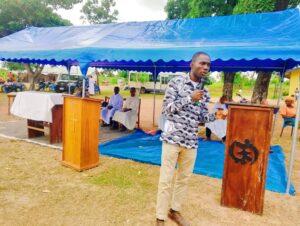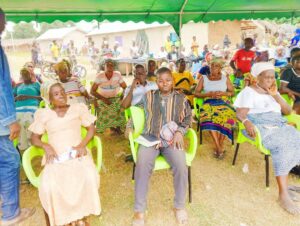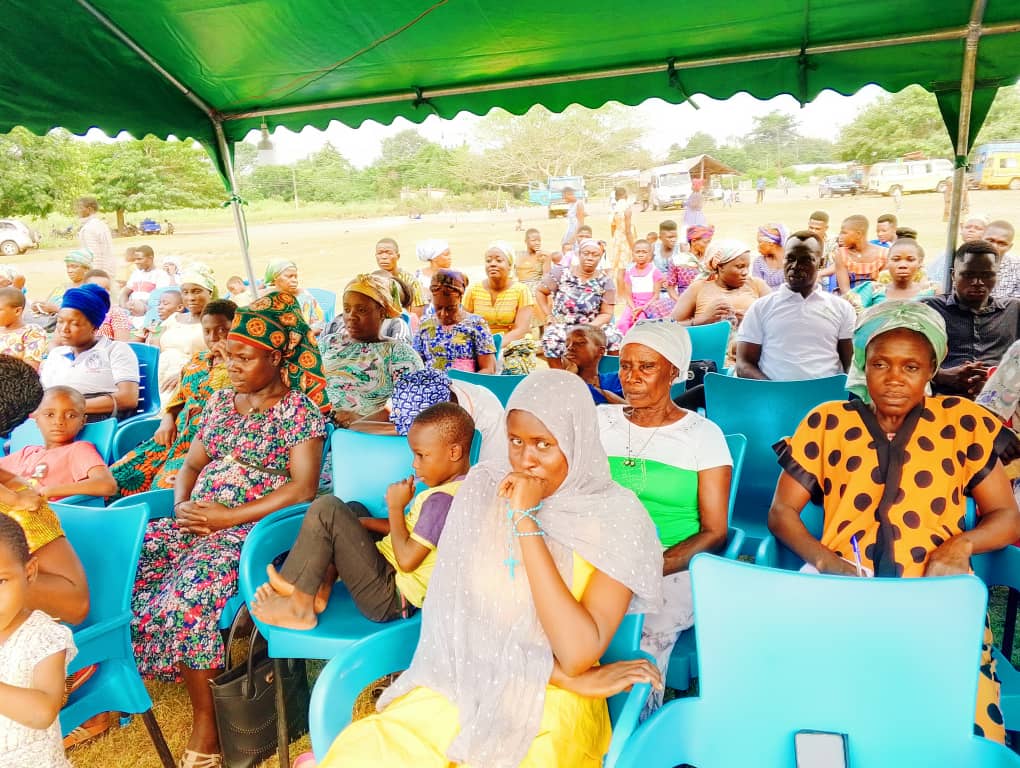Catholic Christians of Afram Plains in Ghana’s Eastern region have been schooled on the causes, prevention and management of Stroke as one of the activities to mark the 2024 Assumption Programme at the St. Paul Catholic Church, Bonkrom, in the Apostolic Vicariate of Donkorkrom, aimed at raising awareness for better living.
The August 17 health talk was delivered by Mr. Ernest Kotoh, a Physician Assistant (PA) at Holy Rosary Health Centre, Amankwakrom, on behalf of the Facility’s in – charge, Sr. Nkechi Oraebosi, MSHR, at the Bonkrom Church compound.
Stroke, he said, “is a disease that happens when there is injury or damage to a particular part of the brain”, adding that when stroke occurs, it affects and make life unbearable.
He said the affected person becomes unable to perform certain activities such as speaking, walking, hearing, and even swallowing since all these functions are being controlled by the brain.
Mr. Kotoh further noted that Stroke can occur when blood flow to the brain is impeded or blocked or when it is under intense pressure, thereby rapturing some vessels of the brain.
The Physician Assistant enumerated some causes of stroke; hypertension being one of the most common.
According to him, hypertension occurs when the blood flows under intense pressure, which sometimes raptures blood vessels within the brain causing injury for some people in that particular part of the brain.
“For you to know that you have developed hypertension,” Mr. Kotoh observed, saying, “Some individuals might complain of having headache, some might complain of feeling dizzy, getting tired just upon doing a little work, feeling that their heart is beating more than necessary”.
He however noted that for some people, hypertension may come without any of the above symptoms, in which case “we always advice people to visit the health centre regularly for their pressure to be checked, so that they can be taken care of”.
The speaker further underlined another cause of stroke, being diabetes malitus. “Diabetes mostly happens when our sugar level is more than it is necessary,” he said. And this, he continued, often comes with some symptoms and signs, some of which include excess urinating, getting thirsty easily, eating a lot, and growing lean, blurred vision, among others.

The Physician Assistant warned against the unmedical and unhygienic common practice of some people urinating and tasting their urine to know if it has sugar or not.
“It is not a good practice and it should be stopped,” he urged, advising them rather to develop the habit of visiting the health centre from time to time and get their sugar level checked.
Another cause of stroke according to the speaker, is what we call high cholesterol or dislepidemia. High cholesterol he said happens “when we eat a lot of fatty foods which tend to impact on our blood vessels, and when this happens, it makes our blood vessels narrower than they ought to be, hence reducing the blood flow to the brain, in which case we are liable to stroke”.
He further underpinned that excess alcohol intake, which builds up a lot of calories, and eventually fat in the blood vessels, reduces blood flow to the brain, and can lead to stroke.
Closely linked to alcohol is chronic smoking, which the medical personnel said can become a risk factor which can cause diabetes and could eventually lead to a rise in the blood pressure, amounting to stroke”.
Mr. Kotoh further observed that physical inactivity and late eating can lead to stroke. “There are people who do not exercise frequently, always eating late, hence storing a lot of calories that in turn clot within the blood vessels, impeding blood flow to the brain,” he remarked.
The Physician Assistant classified the prevention of stroke under two categories: modifiable and non-modifiable factors.
The modifiable factors, according to him, are those one can do something about, for instance, avoid eating late into the night, fatty foods, smoking, excess alcohol intake, very stressful activities, and engage more in physical activities.
“When we reduce these activities, it maintains the potency of our blood vessels which in turn helps to increase blood flow to the brain, thus prevent the occurrence of stroke,” he said.
The non-modifiable factors, he said, are those we can do little or nothing about. “When we look at our age, we know there are some conditions like hypertension, diabetes which increase with age, and you can’t control your age. The more you grow, the more you are predisposed; what we call genetic predisposition,” he underlined.
He continued by saying that there are families that have traces of diabetes and hypertension, and can do little by themselves in terms of working on their lifestyle.

Even so, he said, “there are a whole lot of things we can do, or not do, as already outlined, to help ourselves so that we don’t develop hypertension, diabetes.
The Management of stroke, for those who have it already, the PA underscored has largely to do with lifestyle modification; working on those same factors that would have been worked on, to prevent it.
“Once you have had it, you just have to report to a health facility for them to manage it for you,” he added.
There was another talk during the Assumption Program on Mary, the Model of prayer, delivered by Rev. Gabriel Dabo – Gyamfi, a deacon of the Apostolic Vicariate of Donkorkrom currently residing at St. Cecilia Parish, Fori-Fori.
Other activates during the 3-day programme involving Christians from the 8 Parishes within the Vicariate, together with their priests and the Bishop, Most Rev. John Alphonse Asiedu, SVD, included Rosary recitations and Stations of the Cross up the Bonkrom Mountain, procession in the Bonkrom village with Our Lady’s Statue, Holy Masses, Confessions, Adoration, among others.
By Sr. Sylvie Lum Cho, MSHR, (DEPSOCOM, Donkorkrom Apostolic Vicariate)



